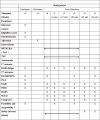MITIG.RA: study protocol of a tailored psychological intervention for managing fatigue in rheumatoid arthritis randomized controlled trial
- PMID: 37803467
- PMCID: PMC10559483
- DOI: 10.1186/s13063-023-07692-4
MITIG.RA: study protocol of a tailored psychological intervention for managing fatigue in rheumatoid arthritis randomized controlled trial
Abstract
Background: Despite remarkable medical advances in the treatment of rheumatoid arthritis (RA), a subset of patients fails to achieve complete clinical remission, as the Patient Global Assessment (PGA) of disease activity remains above 1, even after the inflammatory process is brought under control. This so-called state of 'PGA-near-remission' negatively impacts individuals' functioning and potentiates inadequate care. Fatigue is a distressing and disabling symptom frequently reported by patients in PGA-near-remission, and its management remains challenging. While classic cognitive-behavioural interventions show some benefits in managing fatigue, there is potential for improvement. Recently, contextual-cognitive behavioural therapies (CCBT), like mindfulness, acceptance, and compassion-based interventions, have shown promising results in fatigue-associated disorders and their determinants. This study primarily aims to examine the efficacy of the Compassion and Mindfulness Intervention for RA (MITIG.RA), a novel intervention combining different components of CCBT, compared to treatment-as-usual (TAU) in the management of RA-associated fatigue. Secondary aims involve exploring whether MITIG.RA produces changes in the perceived impact of disease, satisfaction with disease status, levels of depression, and emotion-regulation skills.
Methods: This is a single center, two-arm parallel randomized controlled trial. Patients will be screened for eligibility and willingness to participate and will be assessed and randomized to the experimental (MITIG.RA + TAU) or control condition (TAU) using computer randomization. MITIG.RA will be delivered by a certified psychologist and comprises eight sessions of 2 h, followed by two booster sessions. Outcomes will be assessed through validated self-report measures, including fatigue (primary outcome), perceived impact of disease, depressive symptoms, mindfulness, self-compassion, safety, and satisfaction (secondary outcomes). Assessment will take place at baseline, post-intervention, before the first and second booster sessions (weeks 12 and 20, respectively), and at 32 and 44 weeks after the interventions' beginning.
Discussion: We expect MITIG.RA to be effective in reducing levels of RA-associated fatigue. Secondarily, we hypothesize that the experimental group will show improvements in the overall perceived impact of disease, emotional distress, and emotion regulation skills. Our findings will contribute to determine the benefits of combining CCBT approaches for managing fatigue and associated distress in RA.
Trial registration: ClinicalTrials.gov NCT05389189. Registered on May 25, 2022.
Keywords: Acceptance and commitment therapy; Fatigue; Mindfulness; Psychotherapy; Rheumatoid arthritis; Self-compassion.
© 2023. BioMed Central Ltd., part of Springer Nature.
Conflict of interest statement
The authors declare that they have no competing interests.
Figures

References
-
- Safiri S, Kolahi AA, Hoy D, Smith E, Bettampadi D, Mansournia MA, et al. Global, regional and national burden of rheumatoid arthritis 1990–2017: a systematic analysis of the Global Burden of Disease study 2017. Ann Rheum Dis. 2019;78(11):1463–1471. doi: 10.1136/annrheumdis-2019-215920. - DOI - PubMed
Publication types
MeSH terms
Associated data
LinkOut - more resources
Full Text Sources
Medical

